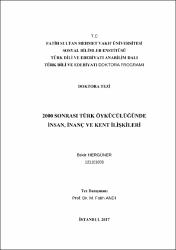2000 sonrası Türk öykücülüğünde insan, inanç ve kent ilişkileri
Citation
HERGÜNER, Bekir, 2000 sonrası Türk öykücülüğünde insan, inanç ve kent ilişkileri, Fatih Sultan Mehmet Vakıf Üniversitesi Sosyal Bilimler Enstitüsü Türk Dili ve Edebiyatı Anabilim Dalı, Yayımlanmamış Doktora Tezi, İstanbul 2017Abstract
Bu çalışmada 2000 sonrası Türk öykücülüğünde insan, inanç ve kent
ilişkilerinin niteliği, önceki dönemlerle olan benzerlik ve farklılıkları tespit edilmeye
çalışılmıştır. Geçmişten bugüne Türk edebiyatında önemli bir yer işgal eden öykü
türünün 2000 sonrasındaki durumu ve Türk edebiyatına katkıları tartışılmıştır.
Çalışmada 2000 sonrası Türk öykücülüğünde insan, inanç ve kent
kavramlarının önceki dönemlere göre oldukça farklılaştığı ve öykülere bu
farklılaşmanın yansıdığı görülmüştür. Bu üç kavramı ve bunlarla ilişkili sorunları
temel izlek olarak odağına alan öykülerin 2000 sonrasında niceliksel olarak arttığı,
öykülerin 2000 sonrasında yeni bir kimlik kazanan insanın, nitelik değiştiren inanç
ve kent ilişkilerinin dünyasından izler taşıdığı anlaşılmıştır.
2000 sonrasında bilgi ve iletişim teknolojilerindeki baş döndüren gelişmelerin
insanı, inancı ve kent ilişkilerini etkilediği, yazılan öykülere de bu gelişmelerle
değişen dönüşen insanın, inancın ve ilişkilerin yansıdığı tespit edilmiştir. Öyküler
üzerinden yapılan değerlendirmelerde insan, inanç ve kent ilişkilerinin küresel ve
yerel ölçekteki gelişmelerden olumsuz yönde etkilendiği, geleneğin yön verdiği
karakter ve kimlik kazandırdığı insan, inanç ve kent ilişkileri anlayışından
uzaklaşılmasına tanık olunmuştur.
İnsan, inanç ve kent arasında ilişkileri gözeten bu çalışmada sosyoloji ve
psikoloji gibi disiplinlerin açımlamalarından yararlanılarak, genelde edebiyatın
özelde öykünün bireysel ve toplumsal değişim ve dönüşümlere etkili ve verimli bir
yansıtma mekanizması olup olmadığı, 2000 sonrasının öyküleri üzerinden
değerlendirilmeye çalışılmıştır. This study aims to identify the quality of relationships among human, belief
and city in Turkish storytelling as of 2000 as well as its similarity to and difference
from the previous terms. This paper also discusses the state of story as a genre with a
considerable weight in Turkish Literature in addition to its contributions to Turkish
literature since 2000.
In this thesis, it has been understood that the terms ‘human’, ‘belief’ and
‘city’ have been employed in different contexts as of the 2000s from those in the
previous terms. These three concepts and related problems are seen to have been
frequently used in Turkish stories starting from 2000, and the number of stories
focusing on these terms them as a main theme has been on the increase. In the stories
after 2000, people/characters adopting new identities have been observed to bear
traces from the changing world of belief and city relationships.
The breath taking developments in the information and communication
technologies as of 2000 have been understood to have affected human beings, their
faith, city and relationships and all these changes have been manifest in the stories of
the time. Reviews of these stories have observed that human beings, their believes
and city are adversely influenced by advancements on global and local scales and
also that traditional understanding of humans, belief and city which has shaped
character and developed identity of individuals has gradually been abandoned in
time.
Studying relationship among humans, belief and city as well as benefiting
from revelations of the two disciplines, sociology and psychology, this thesis paper
attempts to determine whether literature in general and story in particular are
effective and efficient means to reveal individual and social changes and
transformations.



















